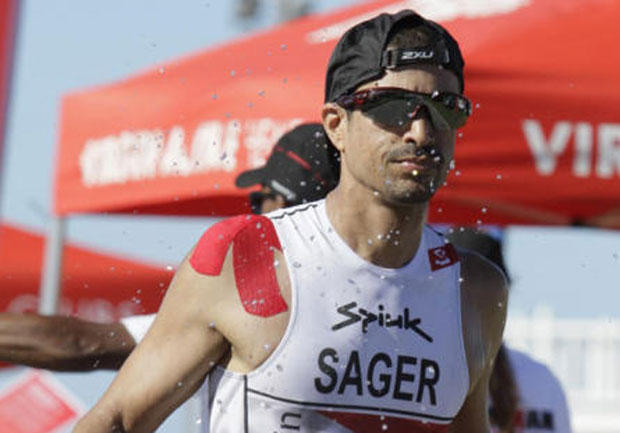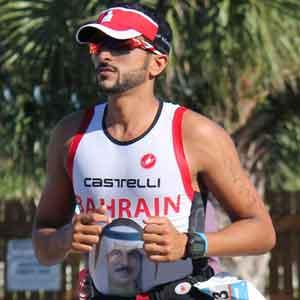On the 6th of December, a little more than 3 months from now, Bahrain will host a triathlon that will, among other things, pay $500,000 in prize money. Challenge Bahrain is a more than just your typical big money race, but I didn't see this until I spent some time with Saqer Al Khalifa, the point man in Bahrain for triathlon. As he put it, "Triathletes putting on a triathlon is different than a tourist bureau putting on a triathlon.” Saqer Al Khalifa [pictured just below] holds a PhD in political science, that education occurring in California not far from where I'm writing. Here's what he had to say when I interviewed him a few days ago.
Slowtwitch: I get the sense that you guys are serious about triathlon. You can't race a full ironman distance and not be serious. How did the Bahrain royal family find triathlon or how did triathlon find it?
Saqer Al Khalifa: I've been a diabetic since 2007. I did the research, saw that I needed to work out, stay healthy, decrease my dependence on medication. Then in 2008 I saw on the news a sprint triathlon in Bahrain, about 60 people took part, I did it, I got so hooked even though I was near the last across the finish. The organizers were the Bahrain Roadrunners, I decided to become a committee member, a volunteer. Once on the committee, instead of one triathlon a year I wanted to do more. I thought 3 were good, so, I pushed for 3. The older generation's view was, "We're a running club,” but I was biased in favor of triathlon. A year later I became the chairman, we had 10 events a year, 5 pure running events, 3 triathlons, plus an aquathlon and a biathlon. When I left the board they kept the events because they were attractive, we invested in a website, a computer timing system.

ST: So, that's you. What about the rest of the Royal Family?
Saqer Al Khalifa: Right before I left the board His Highness Shaikh Nasser bin Hamad Al Khalifa [pictured furthest below] – they're related to me, but I'm about 8 years older and we didn't mix much while growing up – they found out about these triathlons and asked about them, and the conversation was: "Well, there's one coming up in a couple of weeks.” "Okay, we'll do it.” "No, no, you need at least a year to get ready for this.” "No, we'll do it, what do we need?” So I told them first of all you need a bike, you need a helmet, you need shoes, you need to learn how to run, how to swim. But these guys, they're ex-special forces, Navy Seal training, so the only thing missing was the bike. They get bikes a week later, now it's a week before the race. All of a sudden the race is big, because now the media is interested, the TV shows up, [the Royal Family] got hooked right there, at that race. Afterward it's, "What's next, what's the biggest challenge?” They wanted to know everything. I explained it all, the ITU, sprint, Olympic, half, full distance, they were all in, "Let's do the full distance.” "Hold on! Half distance first!” So they said, "Okay half-distance but then immediately after we're doing the full distance.” And everything happened really fast.
ST: This sounds so like my experience. My view, I'm biased, but I don't think multisport is something you retire from, that is, we learn skills like swim, bike, run, then we drift into mountain bike, nordic ski, trail running, and these skills bend the gravities of the rest of our lives, and inform our thoughts, our schedules, our vacations, our choices in friends and life partners. I tend to think this is one of those themes that binds people around the world, as in, maybe I have more in common with you, who lives halfway around the world and lives in a different culture than I have in common with my neighbor 3 doors down. Is this just a Californian's kooky way of looking at things, or could you look at it that way as well?
Saqer Al Khalifa: I think people do connect using their hobbies, and this is a very special hobby. It's not about doing the race, it's about the lifestyle that comes with it. In order for you to do a tri, be an endurance athlete, you need that lifestyle, to be a cyclist, to fit in your swim session, you're always looking for that space in your life to fit your training into. What am I doing escorting this VIP when I could be swimming? We understand each other because of the lifestyle that precedes the starting gun. That's what connects us all. Most of the articles I read are about nutrition, finding time for training, the latest tech, how to be more aerodynamic, how to get the extra second, that's what connects us, that's not a crazy California perspective. It happens all over the world. The only thing that might be different, the American perspective might be a little different than the European view. In America it's commercialized, the brand is what's important, the Ironman distance, I don't think it's fair to name the distance according to the brand, or to have a specific distance be preeminent.
ST: I sense that you guys are lifers. But one thing worries me. It has been my observation that large prize purses are not sticky. They last for 2 or 3 years and then they go away or get pared way down. How sticky is your race and how sticky is its purse?
Saqer Al Khalifa: I think, honestly, we're not introducing something new. We're just following the trajectory. We see data points, we look at the trend, we plot the points, the data points, see the trajectory, and we just stuck our race where we think that line projects. We think we'll be an average purse in a few years, not an extraordinary purse. Used to be just niche companies made tri bikes, like Quintana Roo, but you look at the new Scott Plasma 6, it's a triathlon bike, not a time trial bike. Same with Specialized. That [mainstreaming] is where the market is going.
ST: You mention Quintana Roo. Anybody over there have a QR?
Saqer Al Khalifa: Yeah, I have a Quintana Roo.

ST: I have a little history with that company. But, can we talk about politics a little? Not my normal topic.
Saqer Al Khalifa: No problem.
ST: I, like a lot of us in the Western world, were excited by the Arab Spring and the notion that democracy had found a foothold in the Middle East. I still am, in a primal sense, on the side of the underdog who rises up against what feels to him like tyranny. But I'm not seeing a lot of Switzerlands popping up where the Arab Spring has been most ardent; in fact, the West's posture toward Syria is in flux; is Bashar al-Assad our functional ally against ISIS? It's crazy. I don't want to put words in your mouth so I'll just stop and let you respond.
Saqer Al Khalifa: I'm a political scientist. A lot of political scientists would agree with me, but the analysts and politicians who are not political scientists, most of them jumped the gun. You can't make decisions about peoples' lives this fast. It was a very oversimplified view of the situation. There's a misperception in the West the way Arabs and tribalism works. Different systems constrain different politicians. Every place [in the Arab world] the West exercised its influence to make a change in government is in total chaos today. The only places that are not in chaos were those that absorbed – amid criticism – the pressure by being smart. The smartest thing to do is to acknowledge that you are limited in your resources. You have a wish list, on top of which is to have an approval rate by the majority of your population, whether a democracy, a monarchy, or a constitutional monarchy. Triathlon is just one little thing we can do to bring to the streets of Bahrain a healthy lifestyle, social development, the unity among the population, the rich and the poor coming together in a triathlon waiting at the finish line. There isn't a financial profit for us with this race. The true profit is social development, unity among the population, to level the social gaps, rich and the poor both coming across the finish line.
ST: So, you're telling me that instead of this being a tourism effort, bringing Germans and Englishmen to Bahrain to spend tourism dollars, your vision is social leveling on the starting line?
Saqer Al Khalifa: We go to Mecca every year. All Muslims go there. The rich and the poor wear the same thing, you can't tell them apart. Why can't we do that here, in triathlon? A Mecca in triathlon. Everybody looking the same when in their wetsuits. Bahrainis, even expats, get half off the entry, and His Highness's foundation, any person in Bahraini who can't pay to enter, it'll sponsor his entry. We put $50,000 of the prize purse just for Bahraini citizens. The first beneficiaries of the triathlon will be the citizens of this country and the citizens of the GCC [Gulf Cooperative Council]. Yes, we hope for tourism, but this also circles back to the locals. Triathlon checks every single box, but the most important box is social development. You will never achieve what you want by force, you will never achieve what you want with an air force. You can achieve more by making people like you than by making people fear you. With triathlon you connect with people emotionally, with quality. I'm 15 minutes late for an appointment, but I cannot stop talking about this. I was disappointed when we were talking to Ironman, they couldn't see this. Challenge said we don't want to sell our rights to you, we want to be a part of what you do. This guy, Felix [Walchshöfer, head of Challenge], today he's the most important person in triathlon. He's the person everyone should look to. I love the guy. He came to Bahrain, went everywhere, was captivated by the art, the history of Bahrain, the local market, very good listener, doesn't push his ideas on you, he's a guy you can trust.
ST: I live on the backside of the San Gabriel Mountains, and when I look South I look at Mt. Baldy. I think in your college days [at Claremont Colleges] you looked North to Mt. Baldy. What are your recollections of the San Gabriels? Were you a runner or cyclist when you were here?
Saqer Al Khalifa: When I was doing my PhD I didn't do anything but study; I was engaged in nothing but my qualifying exams prior to my dissertation, and I think that's how I ended up with diabetes. I think Pick up Stix is what got me sick! I love that part of the world. I like the weekends in Victoria Gardens. The first year I was working on my PhD I was in Newport Beach, so it was Fashion Island, Irvine Spectrum. I wish Bahrain and Rancho Cucamonga were next to each other.


